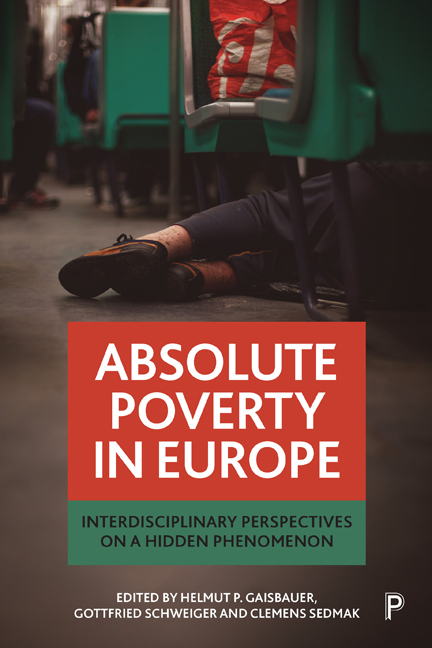Book contents
- Frontmatter
- Contents
- List of figures and tables
- Notes on contributors
- 1 Absolute poverty in Europe: introduction
- Part One Conceptual and methodological challenges
- Part Two Key issues for the absolute poor
- Part Three Policy responses to absolute poverty in Europe
- Part Four Ethical perspectives on absolute poverty in Europe
- Conclusion responding to the dark reality of absolute poverty in European welfare states
- Index
15 - Penalising homelessness in Europe
Published online by Cambridge University Press: 27 April 2022
- Frontmatter
- Contents
- List of figures and tables
- Notes on contributors
- 1 Absolute poverty in Europe: introduction
- Part One Conceptual and methodological challenges
- Part Two Key issues for the absolute poor
- Part Three Policy responses to absolute poverty in Europe
- Part Four Ethical perspectives on absolute poverty in Europe
- Conclusion responding to the dark reality of absolute poverty in European welfare states
- Index
Summary
In its majestic equality, the law forbids rich and poor
alike to sleep under bridges, beg in the streets,
and steal loaves of bread.
(Anatole France,
The Red Lily, 1894)
Absolute poverty and homelessness
The definition and measurement of poverty and homelessness are ever present in scientific and political debate. Both are complex social problems of the first order. For its part, poverty has been viewed as material deprivation, and it has been measured using single-dimension indicators like income or consumption. Among objective conceptions of poverty, in Europe the ‘relative view’ of poverty has prevailed, to the detriment of the ‘absolute view’. Under the ‘relative view’, people tend to perceive their wellbeing in comparison to that of their peers, while under the ‘absolute view’, needs are determined (as essential or minimum standards) regardless of the wealth of others, and not meeting these needs implies a condition of poverty regardless of the context. Absolute poverty is defined as the situation in which an individual's basic needs are not met – that is, there is a lack of basic goods and services (usually related to food, housing and clothing) – and the definition should be applied equally in all countries or societies.
In this context, Cooper (1995) proposed the idea of ‘relative homelessness’ and ‘absolute homelessness’. Absolute homelessness refers to situations of people without a suitable roof over their heads, living on the streets, under bridges and deserted buildings, while relative homelessness considers other forms of homelessness, like having only basic access to shelter: that is, having a roof, but not the elements needed to make a home, or situations where people live in bed and breakfast accommodation; or situations where people live in dwellings that do not meet minimum living and sanitary standards (Tipple and Speak, 2005).
The European Federation of National Organisations Working with the Homeless (FEANTSA) and the European Observatory on Homelessness (EOH) assume that homeless people are subject to a continuum of situations of exclusion from adequate housing: that is, as a dynamic process and not a characteristic of a group or a static condition (Edgar and Meert, 2005).
- Type
- Chapter
- Information
- Absolute Poverty in EuropeInterdisciplinary Perspectives on a Hidden Phenomenon, pp. 313 - 334Publisher: Bristol University PressPrint publication year: 2019
- 1
- Cited by



